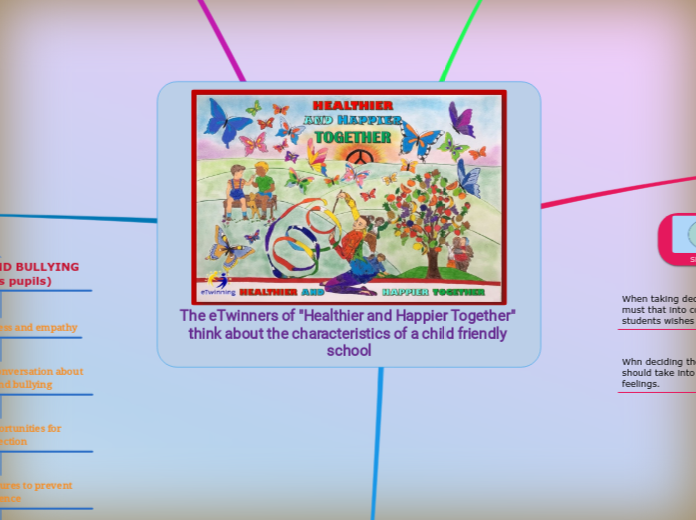The eTwinners of "Healthier and Happier Together" think about the characteristics of a child friendly school
HOW A SUSTAINABLE SCHOOL FACES PROBLEMS
VIOLENCE AND BULLYING (Duygu's pupils)
Teaching kindness and empathy
a whole-school conversation about violence and bullying
Creating opportunities for connection
Targeting measures to prevent violence
Opportunity for teachers to reflect on practices that lead to frustration and low self-esteem among students
Using the arts to create context
PREJUDICE (Caglayan's pupils)
The school supports ethos of inclusion and respect
The school encourages dialogue regarding differences and develops understanding
The students have access to gender-sensitive and relevant textbooks
the students have access to curriculum on life skills for peacebuilding, environmental protection, etc.
DROP OUT (Zehra's pupils)
Connection with parents out of school
Connection with at-risk students
Involving students in extracurricular activities
Pairing students with advisors
Reducing the cost of education
Offer mental health support
Teach children good study habits
Sustainable school - What are the characteristics of a green school? (design, energy efficiency, learning experience, etc.)- How can we make our schools more eco-friendly? (by Greek students)
HOW WE CAN MAKE OUR SCHOOL MORE ECO-FRIENDLY(VICKY'S STUDENTS, 1rst JUNIOR HIGH SCHOOL OF MARKOPOULO)
CAMPAIGNS ABOUT A MORE SUSTAINABLE SCHOOL
RECYCLE
REDUCE WASTE
USE LESS PLASTIC BOTTLES
MAKE ENVIRONMENTAL PROGRAMMES
PLANT TREES
CHARACTERISTICS OF A GREEN SCHOOL (ATHINA XYRAFA STUDENTS ARSAKEIO)
CONSERVES ENERGY AND NATURAL RESOURCES
ENCOURAGES RECYCLING
IMPROVES INDOOR AIR QUALITY
EMPLOYS DAYLIGHTING STRATEGIES
DEVELOPING KEY LIFE SKILLS
STUDENTS UNDERSTAND ISSUES CONCERNING THE ENVIRONMENT AND TAKE ACTION
FEATURES OF A WELCOMING, WELL EQUIPPED, INCLUSIVE SCHOOL (ATHINA GARBOLA STUDENTS ARSAKEIO )
ALL CHILDREN LEARNING TOGETHER IN THE SAME CLASSROOM
SCHOOL ADAPTS TO THE BENEFITS OF ALL STUDENTS
ACCEPTING DIVERSITY
SPORTING FACILITIES SUPPORT STUDENTS IN THEIR GOALS OF LEADING HEALTHY AND ACTIVE LIFESTYLES
EQUALITY AND EQUITY
ENGAGEMENTEMENT OF FAMILIES (by Italian pupils)
Why is the engagement of families important in the promotion of children’s learning?
(by Italian pupils)
A child-friendly school is a family friendly school. It builds relationships with parents and caregivers who have primary responsibility for the well-being of children at all stages of their development. An informed, caring family can be the most stable agent for learning, so the engagement of families in the promotion and strengthening of children’s learning can be among the most effective and lasting interventions. This is particularly critical in the case of families made vulnerable by poverty, disease, conflict, lack of water, fuel or other resources, or by domestic violence; in families in isolated communities not reached by limited government services; and in ethnically marginalized or excluded families
Parents who feel positive about school and are involved in its life are likely to be the best advocates for the school’s values, policies and practices at home, whether by encouraging homework, promoting anti-harassment or supporting cooperation with others. Where there is no contact between home and school, problems in the child’s life may go unrecognized by the school and will not be properly addressed. Even in underprivileged families, high levels of parental support and a positive school climate foster self-confidence and self-esteem.
Families and caregivers have particular roles to play in preparing their children for a child-friendly school and supporting and providing guidance to the school.
In a child-friendly school:
• Parents and households have regular, meaningful two-way communication with the school;
• Parents have an integral role in assisting school learning;
• Parents are full partners in decision making about education outcomes for their children;
• Parents are welcome in the school and their support for children’s learning is sought.
Often families and households do not feel empowered to take on these roles, nor are schools prepared to support them. Therefore, it is important to involve families in their children’s education and establish community school.
Families are children’s first teachers and have a critical role to play in preparing them for school. Parenting styles and the number of resources available for children will either help young children develop the skills, attitudes and behaviours required to flourish in a school community or thwart their abilities to actively participate.
An effective way to prepare parents and caregivers to nurture school-family connections is for communities to develop and organize early childhood centres. Through their involvement, parents begin to understand how to manage a centre and participate in the centre’s decision-making. In such community-based centres, famiglie learn essential skills and their attitudes change as they see first hand how their participation can make a difference. The early childhood centres are not only important in readying young children for school, but also in preparing families, particularly women, for their role with schools.
PARTICIPATION IN EVENTS
The school hosts events that involve children and families, such as inviting parents for an evening of music, drama or poetry reading that demonstrates what their children are learning
COMMUNICATION
In case of illiterate parents or those who are not speakers of the majority language, the school provides oral messages or translated communications into parents’ language
The school uses various communication tools to reach out to parents
DECISION MAKING
parents participate in the educative dialogue of theit children
Parents, caretakers participate in discussions about school policies and activities
CHARACTERISTICS OF A CHILD FRIENDLY HEADTEACHER by pupils form Spain
TALKATIVE
He/she must be a talkative person and not only talk about punishments.
FUNNY
He/she should understand what teenagers think and have a good sense of humour.
CLOSE
A friendly headteacher must be close to his/her students in order to know their feelings and thoughts.
SENSIBLE
A headmaster must understand his/her students' feelings
When deciding the rules they must not be too hard.
SENSITIVE
When taking decitions, a headmaster must that into consideration his/her students wishes too.
Whn deciding the school rules he/she should take into account the others' feelings.
CHARACTERISTICS OF CHILD FRIENDLY TEACHERS by Pupils from Romania
they base their approach on pupils' needs
they collaborate with families, communities, teachers
they participate in training courses to face risky situations such as bullying, gender unequality and discrimination









